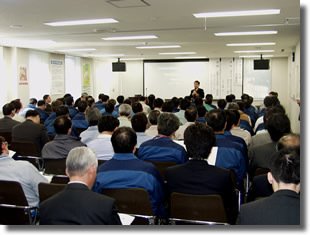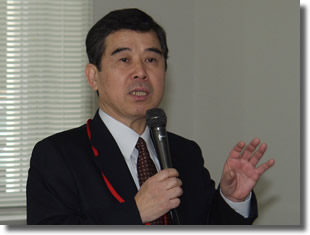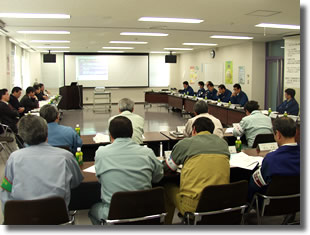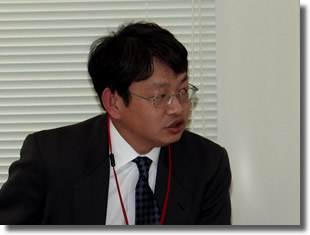|
|
 |
 On 31 Jan 2005, the 70th Safety Caravan visit was held at Fukushima Daini Nuclear Power Station, Tokyo Electric Power Company. On 31 Jan 2005, the 70th Safety Caravan visit was held at Fukushima Daini Nuclear Power Station, Tokyo Electric Power Company.
|
|

Safety Presentation |
 About 90 persons, including the employees of Tokyo Electric Power Company and cooperating companies, attended the Safety Presentation. About 90 persons, including the employees of Tokyo Electric Power Company and cooperating companies, attended the Safety Presentation.
 At the beginning of the presentation, Mr. Masahiro Nomura, deputy plant manager Fukushima Daini Nuclear Power Station, Tokyo Electric Power Company, gave an address and said, At the beginning of the presentation, Mr. Masahiro Nomura, deputy plant manager Fukushima Daini Nuclear Power Station, Tokyo Electric Power Company, gave an address and said,
“Today, we have the 70th Safety Caravan at Fukushima Daini Nuclear Power Station.Mr. Yoshida, professor of the Kumamoto University, lectures on safety, “‘Organizational Safety Management and Understanding of Humanity’ in the morning. This is a good opportunity for us, together with an opinion session in the afternoon. We do want to reflect the presentation and opinions in our future business activities.”
|

|
|
Safety Presentation
|
 After the address, Mr. Machida, General Manager of NSnet, introduced NSnet activities, and this was followed by a lecture entitled “Organizational Safety Management and Understanding of Humanity-Group Dynamics of Human Error” delivered by “Prof. Michio Yoshida, Center for Educational Research and Training, Faculty of Education, Kumamoto University” After the address, Mr. Machida, General Manager of NSnet, introduced NSnet activities, and this was followed by a lecture entitled “Organizational Safety Management and Understanding of Humanity-Group Dynamics of Human Error” delivered by “Prof. Michio Yoshida, Center for Educational Research and Training, Faculty of Education, Kumamoto University”
|

|
|
Mr.Yoshida
|
 During the lecture he lectured on creation of safety culture in terms of organizational safety management and understanding of humanity. During the lecture he lectured on creation of safety culture in terms of organizational safety management and understanding of humanity.
-Design and operation of equipment and facilities must be fail-safe. An operator must feel unsafe. If he feels something wrong, he is required to consider it to be dangerous, being very sensitive to potentially danger events. He should not determine that it’s all in his imagination and misunderstanding
.-If he has no “knowledge” on safety, he cannot ensure safety. However, even if he has the knowledge, an accident will occur. He is required to be “conscious” of making use of the “knowledge.” Furthermore, safety is not accomplished until his safety “awareness” leads to safety “action.”
-It is important for you to create an organization and corporate environment in which employees are willing to apologize for their mistakes. Without such corporate culture, near accidents, root causes of errors and accidents, do not come to surface
.-There are five devil’s rules that jeopardize an organization: “Habituation,” “Wrong generalization of experiences,” “Memory processing and story creation,” “No accident occurrence with manual violation,” “Accident occurrence even with manual adherence.”
-Organizational Peace/Health/Safety (PHS) cannot be realized until individual PHS is ensured. Moral is undermined before collapse of the moral. Moral-up greatly relies on the presence or absence of leadership. Human factor fundamentals are human relations and leadership.
-To eliminate human errors, it is desirable not to work. But, this does not serve as a problem-solving method. Serious accident risks resulting from human errors represent evidence of important works implemented. This is a real situation of a nuclear power station as an organization. In the sense, I want all of you to be engaged in your works with your confidence and pride.
|

Safety information exchange session |

|
|
Safety information exchange session
|
|

|
|
Mr.Hangai
|
 At the safety information exchange session, Mr. Koichi Hangai, Mnager, Nuclear safety & Quality Assurance management office 2, Genakai Nuclear Power Station, Kyushu Electric Power Co., Inc., made a presentation on “Approach to Creation of Safety Culture in Genkai Nuclear Power Station.” Mr. Hiroaki Mori, Turbine Group Manager, Fukushima Daini Nuclear Power Station, Tokyo Electric Power Co., Inc., also made a presentation on “Approach to response to the accident of Mihaha Unit 3,” while opinions on safety culture and work leadership were exchanged. At the safety information exchange session, Mr. Koichi Hangai, Mnager, Nuclear safety & Quality Assurance management office 2, Genakai Nuclear Power Station, Kyushu Electric Power Co., Inc., made a presentation on “Approach to Creation of Safety Culture in Genkai Nuclear Power Station.” Mr. Hiroaki Mori, Turbine Group Manager, Fukushima Daini Nuclear Power Station, Tokyo Electric Power Co., Inc., also made a presentation on “Approach to response to the accident of Mihaha Unit 3,” while opinions on safety culture and work leadership were exchanged.
|
The main information and opinions exchanged included:
| ● |
For a principle of field priority promoted by Kyushu Electric Power Co., Inc., a cooperation company office location may be a great contributor to safety culture. In the case of Kyushu Electric Power Co., Inc., cooperation company offices are just adjacent to its nuclear power station sites. |
| ● |
An ability to exert leadership can be improved through training, but it’s a fact that some people require a lot of time to change their behaviors and vice versa due to their personalities. However, it is important for you to continue improvement, believing that you can change your behaviors. For example, given your followers present 20 requests, if you implement 1 or 2 of the requests with which you are satisfied and which you may be able to realize, so that your behavior can be observed by your followers, your action for other items will be highly appreciated by the followers. In addition, your views will be changed. |
| ● |
Pilots’ works consist of seemingly monotonous and uninteresting operations, depending on how one looks at it. They cannot move even 1m without directions and have to observe many procedures in a small space. They seem to pay attention to their operations at the beginning and end of flights. However, these pilots are proud of their works, having a mission to carry passengers and goods in a safe and reliable manner. Similarly, it will be good practice for operators to find the value of their works and feel proud of them. |


|
|
|
|







